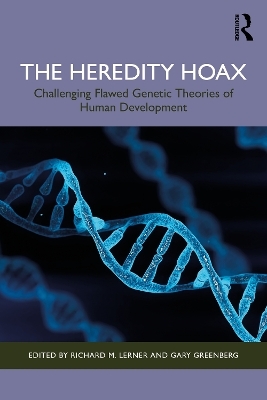
The Heredity Hoax
Routledge (Verlag)
978-1-032-69957-8 (ISBN)
- Noch nicht erschienen (ca. Januar 2025)
- Versandkostenfrei
- Auch auf Rechnung
- Artikel merken
This innovative and thought-provoking book integrates both new, authored material and reprints of existing literature that, together, provide a compelling narrative that reveals the fatally flawed science associated with genetic reductionist accounts of human behavior and development.
Through an interdisciplinary lens, it illuminates the dynamic nature of human development, empowering readers to question established notions, and embrace the complexity of our potential. Across the book, the work of top-tier scientists, from developmental, comparative, educational, and biological science illuminates theory and research converging on the conclusion that the multiple egregiously flawed work of genetic reductionists should be expunged from research pertinent to human development. The book challenges the prevailing reductionist narratives and their application to social policies, programs, and uses in media. Theoretically based and empirically rigorous, this multidisciplinary approach to human development will shine a light on the inequities in individuals or groups that suggest that specific genes do not enable them to succeed in life.
The Heredity Hoax invites graduate schools and advanced undergraduate courses on human development, human potential, epigenetics, and more to delve into the intricate interplay between genes, environment, and personal growth. This will also serve as an unimpeachable source of evidence for researchers, educators, and social policymakers.
Richard M. Lerner is the Bergstrom Chair in Applied Developmental Science and the Director of the Institute for Applied Research in Youth Development in the Eliot Pearson Department of Child Study and Human Development at Tufts University. Gary Greenberg is Professor Emeritus of Psychology at Wichita State University and Co-founder (with Ethel Tobach) of the International Society for Comparative Psychology and has been a comparative psychologist for his entire career.
Preface Section 1. Framing the Choice: The Pseudo-evidence and pessimism of genetic reductions vs. the evidence and optimism from research framed by dynamic, relational development systems-based concepts 1.1. Addressing the heredity hoax in science and society 1.2. The fallacies and failures of genetic reductionism Section 2. Metatheory and theory about the nature-nurture coaction 2.1. Metatheory and the primacy of conceptual analysis in developmental science 2.2. The failure of biogenetic analysis in psychology 2.3. What Galton’s Eugenics Has Wrought Section 3. The concepts of instinct and critical periods 3.1. Development evolving - The origins and meanings of instinct 3.2. Critical period- A history of the transition from questions of when, to what, to how 3.3 Short arms and talking eggs - Why we should no longer abide the nativist–empiricist debate Section 4. Evolution 4.1 Toward a new developmental and evolutionary synthesis 4.2. Précis of Evolution in Four Dimensions 4.3. Developmental evolution 4.4. Evolving evolutionary psychology 4.5. Evolution beyond neo-Darwinism Section 5. Behavior genetics: Heritability, Twin studies, adoption studies, and IQ 5.1. From gene to organism - The developing individual as an emergent, interactional, hierarchical system 5.2 The heritability fallacy 5.3. The 1990 “Minnesota Study of Twins Reared Apart” IQ Study Section 6. Sociobiology 6.1 Sociobiology and the theory of natural selection 6.2. Sociobiology and human development Section 7. Epigenetics 7.1. Social regulation of human gene expression 7.2. Human Social Genomics 7.3. Behavioral epigenetics 7.4. Dynamic heredity Section 8. Implications for Programs and Policies 8.1. The Bell Curve at 30 - A Closer Look at the Within- and Between-Group IQ Genetic Evidence 8.2. Implications for educational practice of the science of learning and development 8.3. Whole-child development, learning, and thriving in an era of collective adversity, disruptive change, and increasing inequality 8.4. Promoting positive human development through dynamic, relational developmental systems
| Erscheint lt. Verlag | 30.1.2025 |
|---|---|
| Zusatzinfo | 5 Tables, black and white; 15 Line drawings, black and white; 14 Halftones, black and white; 29 Illustrations, black and white |
| Verlagsort | London |
| Sprache | englisch |
| Maße | 174 x 246 mm |
| Themenwelt | Geisteswissenschaften ► Psychologie ► Allgemeine Psychologie |
| Geisteswissenschaften ► Psychologie ► Biopsychologie / Neurowissenschaften | |
| Geisteswissenschaften ► Psychologie ► Entwicklungspsychologie | |
| Naturwissenschaften ► Biologie ► Genetik / Molekularbiologie | |
| ISBN-10 | 1-032-69957-4 / 1032699574 |
| ISBN-13 | 978-1-032-69957-8 / 9781032699578 |
| Zustand | Neuware |
| Informationen gemäß Produktsicherheitsverordnung (GPSR) | |
| Haben Sie eine Frage zum Produkt? |
aus dem Bereich


